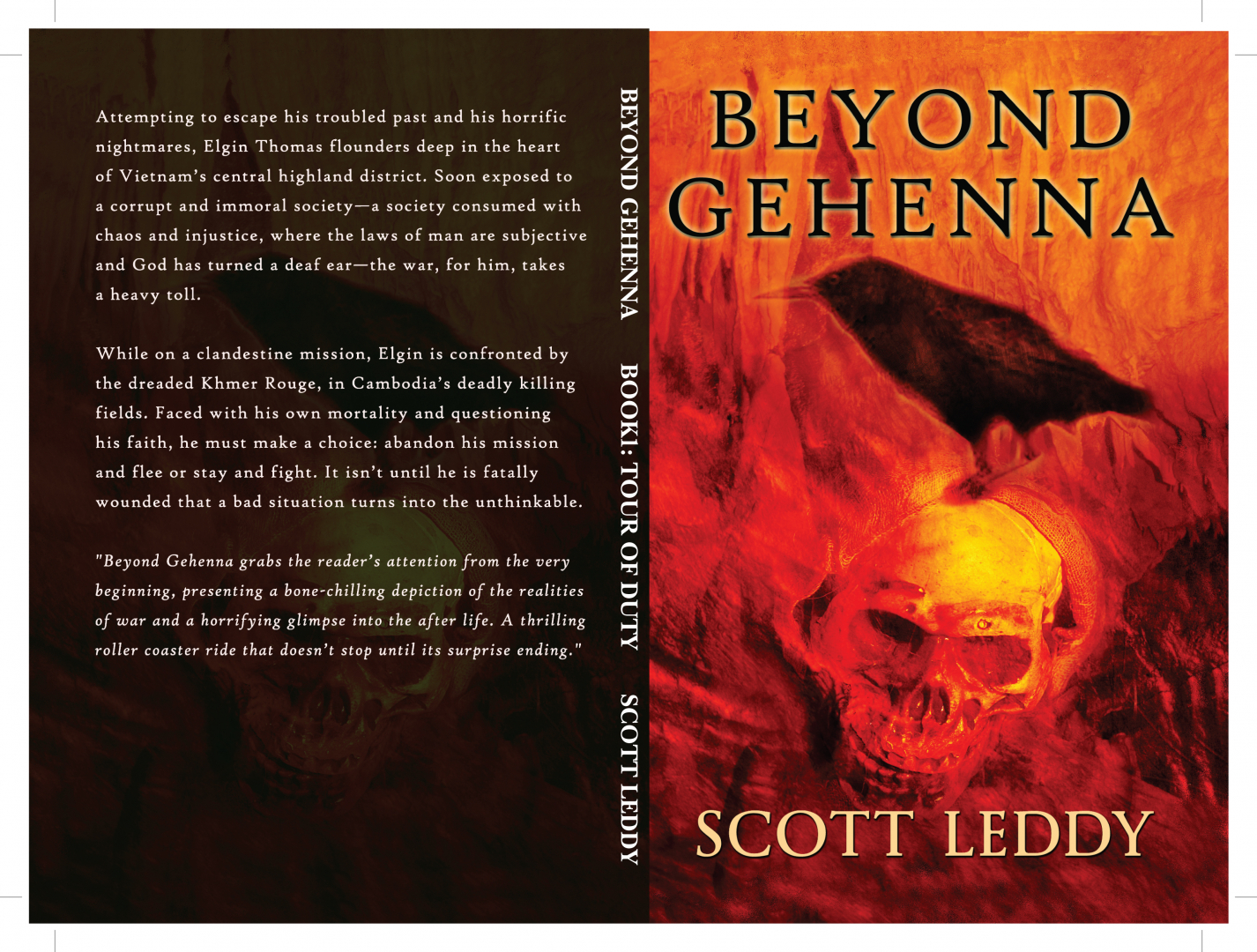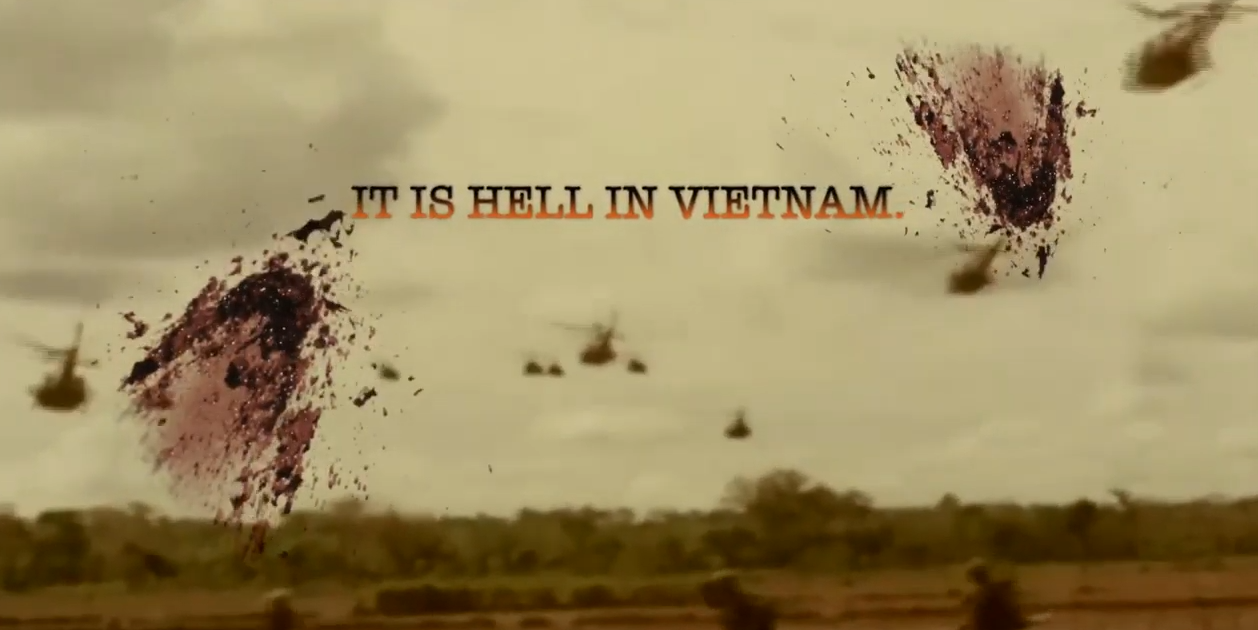Attempting to escape his troubled past and his horrific nightmares, Elgin Thomas enlists in the army and eventually finds himself floundering deep in the heart of Vietnam’s central highland’s district. Soon exposed to a corrupt and decadent society—a society plagued with chaos and injustice, where the laws of man are subjective and God appears to have turned a deaf ear—the war for him takes a heavy toll.
Summoned to Saigon by his superiors, Elgin is eventually recruited as the leader of a rogue band of misfit soldiers, whose clandestine mission is to infiltrate an enemy stronghold near the Cambodian border and neutralize several North Vietnamese high-ranking generals. Traversing through the Vietnam scrublands proves difficult, however, and there are many casualties along the way.
Elgin was raised by his domineering mother—a woman fixated on the paranormal—and his aunt, who has strong ties to the occult. Elgin hoped that by escaping to Vietnam, he would leave behind his ghastly dreams and his connection with the supernatural—a seemingly impossible feat. Along our protagonist’s travels, he meets up with a sinister black crow that pops up every now and then to taunt and intimidate him. Unclear whether the mystical creature is a spy or messenger from another world, Elgin shuns this beast of burden, but to no avail.
It isn’t until Elgin and his trusted friend, Scout, stumble upon a vacant, dilapidated Buddhist Temple, appearing out of place for the surroundings, does he realize that his past has crept up on him.
The mission turns deadly when Elgin is soon confronted by the ruthless Khmer Rouge, in Cambodia’s deadly killing fields. Faced with his own mortality and continuing to question his faith, he must choose whether to abandon his mission and flee, or stay and complete his objectives. However, when he is fatally shot, a bad situation quickly turns into the unthinkable.
An Excerpt from:
Beyond Gehenna
Book I: Tour of Duty
Copyright © 2008 Scott Leddy
The pale moonlight of the witching hour streamed in through the high windows of the abandoned building, but was lost among the light of the many candles. Around thirteen people had assembled to take part in the ceremony, the others just there to watch. A low turn out. The building, huge, empty, and intimidating, was just dark enough to hide the area surrounding those who gathered in the center.
The rain beat down upon the jagged tin roof with ferocious tenacity; the inclement weather marked the beginning of Vietnam's lengthy monsoon season. Darkness seemed to fall early that night. Its therapeutic serenity provided the soothing comfort of a mother's protective womb. The graceful tranquility of the evening hours had always intrigued me. I lay in my bunk often, lethargically listening to the tempest conditions and reflecting past events.
Stationed at Camp Halloway for the better part of my second tour of duty, I was comforted in the fact that the heavily fortified compound had built a sound reputation as being impermeable to enemy forces. Littered with sandbag bunkers and spiraled barbed wire encroachments, the base's personnel were mainly comprised of American Special Forces operatives and military technical advisors. We were strategically located approximately five kilometers directly south of Pleiku, just below the 17th parallel, in Vietnam's central highland district.
This region was a scenic marvel, consumed with a scattering of abundant vast rolling hills and dense, misty forest peaks. The village of Pleiku, until recently, was a quiet market town for local tribesmen. Converted into the South Vietnamese army headquarters, the stronghold constricted the flow of Vietnamese hostiles infiltrating the southern borders. It was our duty to work jointly with the South Vietnamese authorities, to train their troops, and support their efforts in discouraging the advancement of guerrilla movement down the Ho-Chi-Minh Trail. The trail, an intricate web of fragmented logistical by-ways, weaved in and out of the Laotian, Cambodian, and Vietnamese borders. It acted as a tactical supply route for North Vietnamese insurgents and was dedicated for the transportation of both information and armaments from the north to the south--for the most part, an unstable region.
Vietnam was Darwinism at its simplest and purist form; the survival and perseverance of the most physically and mentally sound. Life in the region was generally melancholy. The subtropical humidity could be unbearable at times, and festering insects were more prone to pester us than any altercations with combative insurgents. I would safely estimate that seventy percent of all United States Servicemen stationed there generally got high on one substance or another. The land of plenty, where one could easily attain anything from marijuana and alcohol, to heroin and pure opium.
I assumed that there was a direct correlation between the substantial addiction rate and the large percentage of United States minorities stationed in Vietnam. They were, by nature, less educated and motivated than their white counterparts. I personally had little use for narcotics. They affected the mind's ability to make clear, concise, and comprehensive decisions. Drugs scrambled the brain, clouding one's judgment, and made the physical largely ineffective.
Besides, several years ago I had a dreadful experience after a hallucinogenic. I imagined creepy critters scurrying up the walls of my bedroom. The event drove an irreversible wedge between my mother and myself. After that episode, the nature of our relationship seemed adversely affected forever. I wish that I could take back that dreadful night...but I can't. That's when the unpleasant nightmares began, and they have been a part of me ever since.
There were moments in the region when the monotony gave way to episodes of sheer terror, when adrenaline and fear drove the body and challenged the very essence of my sanity. For example, while patrolling a remote area known as Hell's Pass, located in the Ia Drang valley, Vietcong guerrillas ambushed a five-man U.S. army reconnaissance patrol. The dense jungle thicket camouflaged the rebel bandits. They waited patiently, crouched in the forest. The deep, narrow ravine surrounding the encampment provided inadequate protection from the patrol's imminent onslaught. The enemy rapidly descended upon them, entrenching them in the valley and sealing their fate. One survivor described the attack in prodigious detail, relating the slaughter to Custer's defeat at the battle of Little Bighorn.
"Charlie was waiting for us in the brush, hunting us like prey...waiting for the opportunity to cut us down," he babbled. He then told us his torturous ordeal in graphic detail.
His aggressors subjected him to unspeakable acts. After yanking out all of his gold fillings, they made him dine on his own feces. They tied his naked, feeble body to a vertical stake and doused him with gasoline. His captors reveled in his pain, laughing while they broke several bones in his hands and fingers. They waved lit matches in front of his face, threatening to torch him unless he substantiated certain military information. The "Mind Fuck" was too much for him, and he begged his captors to end his life in a merciful act of euthanasia.
In the end, they simply wandered off, leaving the poor sap to bake in the sun. Days later, he regained consciousness and escaped. His broken, dislocated appendages made it easier for him to contort his hands and slip through the knots.
This ridiculous, demoralized shell of a man eventually crawled back into camp. He ranted and raved, suffering from malaria. The fever made him delirious, and he pranced around, foaming at the mouth like a rabid dog.
His severely burned body was a mass of fresh scar tissue. Puss oozed from his pre-gangrenous wounds, displaying signs of irreversible tissue decay. The combination of the effects of gasoline and the sun's intense rays nearly baked out his eyes. This, of course, resulted in partial blindness, forever changing his life.
I heard through the grapevine of his institutionalization back in The States. When one considers the adversity that this man faced, I had to admire his persistent will to survive. Placing myself in that same situation, I was confident that I would have ended my own life days earlier. After all, suicide is a dignified alternative, acceptable in many cultures. I just couldn't picture myself saying, "I will gladly pay you Tuesday for a dung burger today." Honestly, I had no sympathy for him, or for the other men of the patrol. The truth of the matter was that they were sloppy. They messed up, and it cost them their lives.


